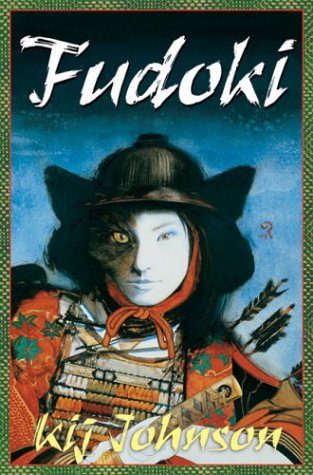Fudoki
Kij Johnson
Fiction
Reviewed By: NinjaUsagi
Review posted: 08/20/04
I'll be honest. This is my third attempt at writing a review for this book, mainly in an attempt not to sound like a history lesson or a college lecture. Some of you out there might actually enjoy that, but no Ninja or Pirate would sit down and converse with me about classical Japanese literature, so neither shall I try with you, although this book did have me thinking it read just like the classical literature translations I've read.
 Fudoki reads like the set of journals of the elderly Japanese princess, Harueme. She has lived a long life, and is now preparing herself to live out her remaining time as a Buddhist nun. In her journals, Harueme reminisces about her life as a princess, her half-brother (an emperor), her lovers and friends; but more important than herself is a story she feels compelled to create: a young cat living in the capital city loses her family in a fire, and so their grounds, their history, their collective stories, their fudoki is lost as well, and the cat runs from the city. While she is on the road to the east, she takes on the form of a woman, be it thanks to the kami (gods) or otherwise. Her journey leads her to meet up with a warband seeking revenge, and takes on the name "Kagaya-hime."
Fudoki reads like the set of journals of the elderly Japanese princess, Harueme. She has lived a long life, and is now preparing herself to live out her remaining time as a Buddhist nun. In her journals, Harueme reminisces about her life as a princess, her half-brother (an emperor), her lovers and friends; but more important than herself is a story she feels compelled to create: a young cat living in the capital city loses her family in a fire, and so their grounds, their history, their collective stories, their fudoki is lost as well, and the cat runs from the city. While she is on the road to the east, she takes on the form of a woman, be it thanks to the kami (gods) or otherwise. Her journey leads her to meet up with a warband seeking revenge, and takes on the name "Kagaya-hime."
Fudoki is creative in that really, what would a cat do or think or feel if it were given a human form? It's an interesting concept, and I think Johnson does a good job with it. Harueme as well makes "Fudoki" almost like two novels in one, although Johnson has written it so the lives of Harueme and Kagaya-hime almost intertwine. Kagaya-hime is driven to journey onwards, as much as Harueme is driven to continue writing in her journals. The story has a sort of bittersweet ending, neither happy nor sad, just more melancholy in a way that I think suits the novel.
This might be a novel for someone who might be interested in what classical Japanese literature is like without going through the trouble of say, reading the over 1,000 pages of the famous Genji Monogatari by Murasaki Shikibu. Johnson did her homework, because the style she uses is very much like the ones the translators use (whether it corresponds to the style of the original Japanese works, I may never know). Perhaps because of this, a slight word of caution: there are probably some cultural and historical references that won't really be understood by the average reader; I almost felt like there needed to be footnotes!
A good novel, overall, and I look forward to reading other Kij Johnson works.
|




 Fudoki reads like the set of journals of the elderly Japanese princess, Harueme. She has lived a long life, and is now preparing herself to live out her remaining time as a Buddhist nun. In her journals, Harueme reminisces about her life as a princess, her half-brother (an emperor), her lovers and friends; but more important than herself is a story she feels compelled to create: a young cat living in the capital city loses her family in a fire, and so their grounds, their history, their collective stories, their fudoki is lost as well, and the cat runs from the city. While she is on the road to the east, she takes on the form of a woman, be it thanks to the kami (gods) or otherwise. Her journey leads her to meet up with a warband seeking revenge, and takes on the name "Kagaya-hime."
Fudoki reads like the set of journals of the elderly Japanese princess, Harueme. She has lived a long life, and is now preparing herself to live out her remaining time as a Buddhist nun. In her journals, Harueme reminisces about her life as a princess, her half-brother (an emperor), her lovers and friends; but more important than herself is a story she feels compelled to create: a young cat living in the capital city loses her family in a fire, and so their grounds, their history, their collective stories, their fudoki is lost as well, and the cat runs from the city. While she is on the road to the east, she takes on the form of a woman, be it thanks to the kami (gods) or otherwise. Her journey leads her to meet up with a warband seeking revenge, and takes on the name "Kagaya-hime."